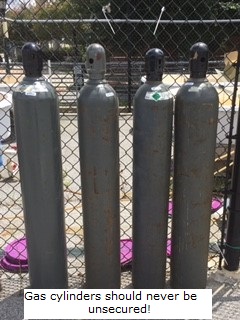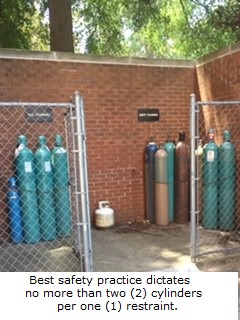EHS has noticed an alarming increase in unsecured cylinders across campus. The greatest physical hazard represented by the compressed gas cylinder is the tremendous force that may be released if it is knocked over. Since they are highly pressurized, they can become missile-like projectiles.
- Ensure that all outdoor storage areas for cylinders are secured and locked. Areas should be dry and protected from extremes of weather. While in storage, cylinder caps must firmly be in place.
- Separate gases by type and store in assigned locations that can be readily identified. Store cylinders containing flammable gases separately from oxygen cylinders (20 feet apart).
- Cylinders in use must be secured with some form of fastener. Floor or wall brackets are ideal for stationary use. Portable bench brackets are recommended when a cylinder must be moved around. Smaller stands are available for lecture bottles.
- Wear safety glasses and nitrile gloves when handling cylinders.
- Always move cylinders by using hand trucks or carts that are designed for this purpose.
- Full details on safe cylinder storage can be found at: www.ehs.gatech.edu/chemical/lsm/9-12


